About
A Force for Working Families
As the Industrial Division of CWA, IUE-CWA represents a force of 150,000 active and retired men and women united collectively to seek dignity on the job and a secure future for ourselves, our children and all future generations. The Division is headed by President Carl Kennebrew.
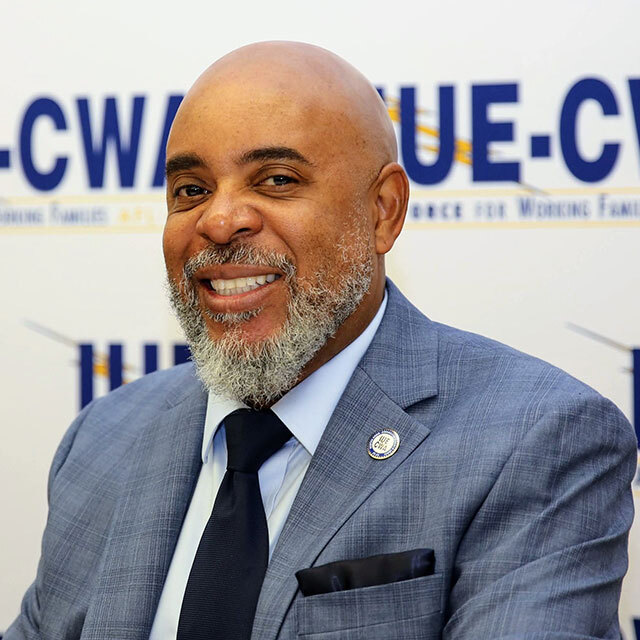
President
Carl Kennebrew became the 8th President of IUE-CWA on August 2, 2018. Carl has been a proud member of IUE-CWA for nearly 25 years. He started his Union career as an elected delegate and Vice-President of Local 84755 in Dayton, Ohio. While Vice-President, Carl graduated from The Minority Leadership Institute (MLI), an intensive 3-week program dedicated to increasing the involvement of minorities at all levels of our union. As Vice President, Carl also worked as an organizer, served as the local’s Legislative Political Action Team Member, and as an Executive Board Member for the Dayton Miami Valley AFL-CIO. In August of 2013, Carl became the first Minority President of Local 755, the founding local of IUE-CWA. He was re-elected without opposition in the fall of 2014 and 2017.
In addition, Carl served as a Recruitment Specialist for the Green Alliance for Manufacturing Skills Training in 2012, a program offering dislocated workers free training and certification in the nationally recognized Certified Production Technician (CPT). While employed by DMAX Ltd in Dayton, Ohio, Carl served for ten years as a Leadership Trainer, teaching both management and union members classes such as Diversity, Change, Communication, Team Concept, and many others. Carl obtained Life Coach Certification through Fowler Wainwright International Institute of Professional Coaching and also became a John Maxwell Certified Leadership Trainer and Mediator.
President Kennebrew is a long-time supporter of many community and partner groups such as Stand Up Ohio and the MVOC (Miami Valley Organizing Collaborative). He serves as a Board Member for The OOC (Ohio Organizing Collaborative), a Board Member of Triune Skilled Development Services, whose goal is to assist persons living in subsidy housing with finding their own self-worth and becoming positive forces within society, a a Board Member for GDUCI (The Greater Dayton Union Co-op Initiative), a Board Member for The United Way of the Greater Dayton Area, and a Dayton Metro Library Board of Trustee. Additionally, Carl was ordained last year as a Minster for Revival Center Ministries.
In 2017, Carl was recognized one of the Top Ten African American Males in the Miami Valley. Additionally, Carl has also received the Staircase to Excellence Award, the United Way Volunteer of The Year Award, and Dayton’s Men of Influence award.
President Kennebrew resides in Dayton, Ohio with his wife, Shamica.
History
Links
Follow these links for even more resources.
- IUE-CWA Local 1177 (Fallon, Nev.)
- IUE-CWA Local 123 (Jenkintown, PA)
- IUE-CWA Local 130 (Baltimore, Md.)
- IUE-CWA Local 162 (Roanoke, Va.)
- IUE-CWA Local 174 (Shenandoah, Va.)

 IUE founding father Jim Carey, the so-called “boy wonder” of the labor movement.
IUE founding father Jim Carey, the so-called “boy wonder” of the labor movement.
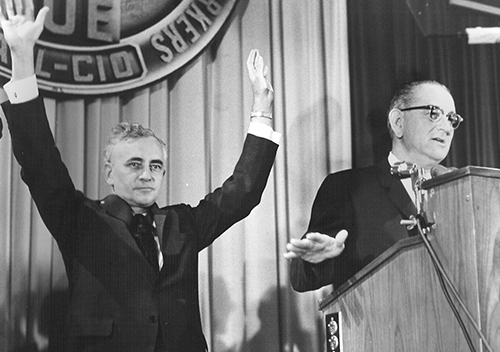 Celebrating Carey’s election as IUE president at the 1950 convention in Milwaukee.
Celebrating Carey’s election as IUE president at the 1950 convention in Milwaukee.
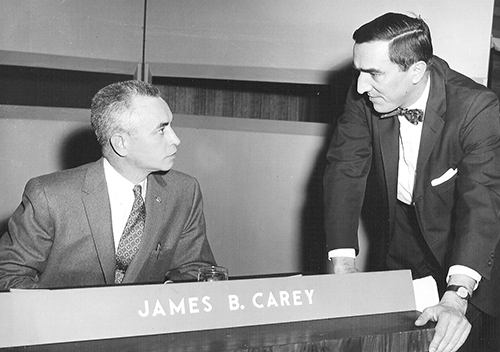 The campaign in Dayton for a General Motors plant focuses on the benefits an IUE contract has always stood for.
The campaign in Dayton for a General Motors plant focuses on the benefits an IUE contract has always stood for.
 Dues payments were always an issue. Here, the argument is made at the 1950 convention.
Dues payments were always an issue. Here, the argument is made at the 1950 convention.
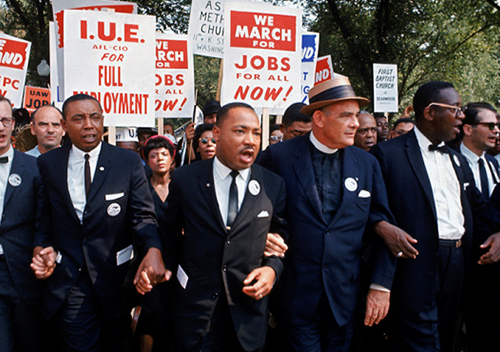 IUE members march on jobs for all.
IUE members march on jobs for all.
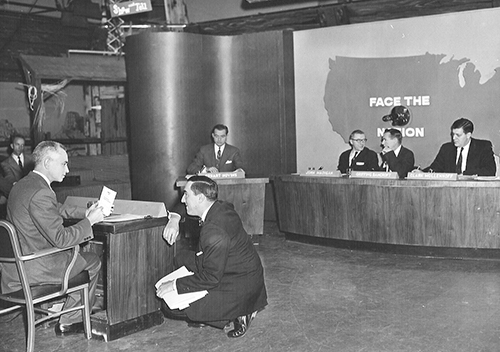 James Carey on Face the Nation.
James Carey on Face the Nation.
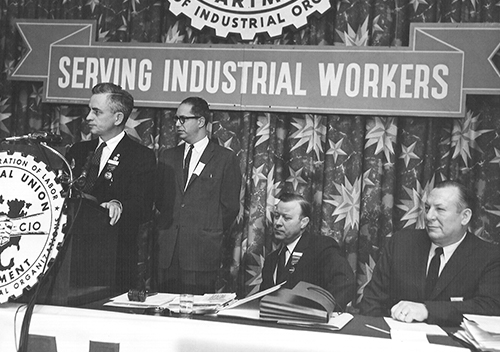 A 1960 booklet exposing GE’s propaganda is the forerunner of today’s corporate campaigns. Carey also attended and spoke against GE policies at the company’s shareholders meetings — a novel idea at the time.
A 1960 booklet exposing GE’s propaganda is the forerunner of today’s corporate campaigns. Carey also attended and spoke against GE policies at the company’s shareholders meetings — a novel idea at the time.
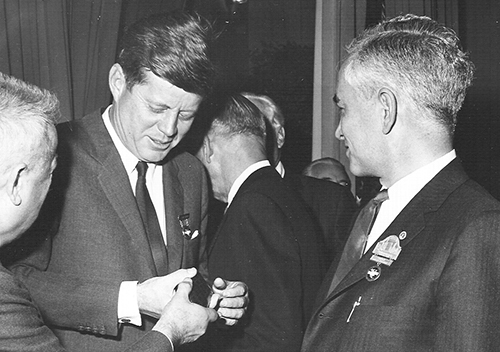 Prominent politicians like Presidents JFK and Harry Truman have addressed IUE conventions. Truman maintained close ties with IUE founder James Carey even after leaving the White House.
Prominent politicians like Presidents JFK and Harry Truman have addressed IUE conventions. Truman maintained close ties with IUE founder James Carey even after leaving the White House.
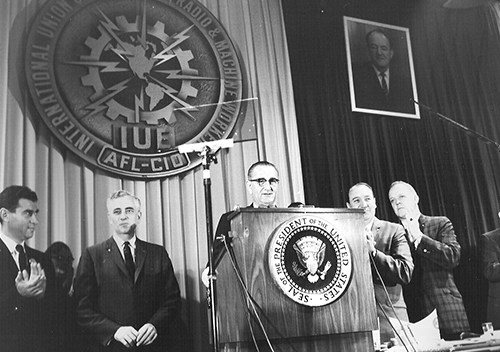 President Lyndon B. Johnson addresses IUE’s 11th Constitutional Convention. He used the IUE stage to advance his Great Society Program, which was strongly endorsed by members attending the convention.
President Lyndon B. Johnson addresses IUE’s 11th Constitutional Convention. He used the IUE stage to advance his Great Society Program, which was strongly endorsed by members attending the convention.
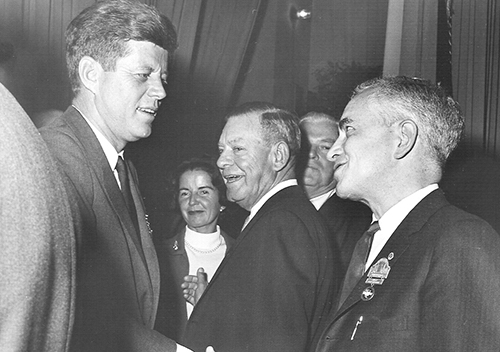 President John F. Kennedy greets IUE members at the White House during a break from an IUE Full Citizenship Conference. Kennedy promoted his civil rights agenda to the receptive crowd.
President John F. Kennedy greets IUE members at the White House during a break from an IUE Full Citizenship Conference. Kennedy promoted his civil rights agenda to the receptive crowd.
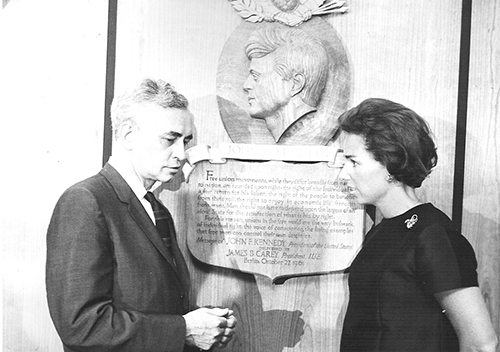 Women have always played a prominent role in IUE’s history. Early on, IUE established a Women’s Council to promote the advancement of women on the job. IUE also has led the fight for pay equity and against pregnancy discrimination.
Women have always played a prominent role in IUE’s history. Early on, IUE established a Women’s Council to promote the advancement of women on the job. IUE also has led the fight for pay equity and against pregnancy discrimination.